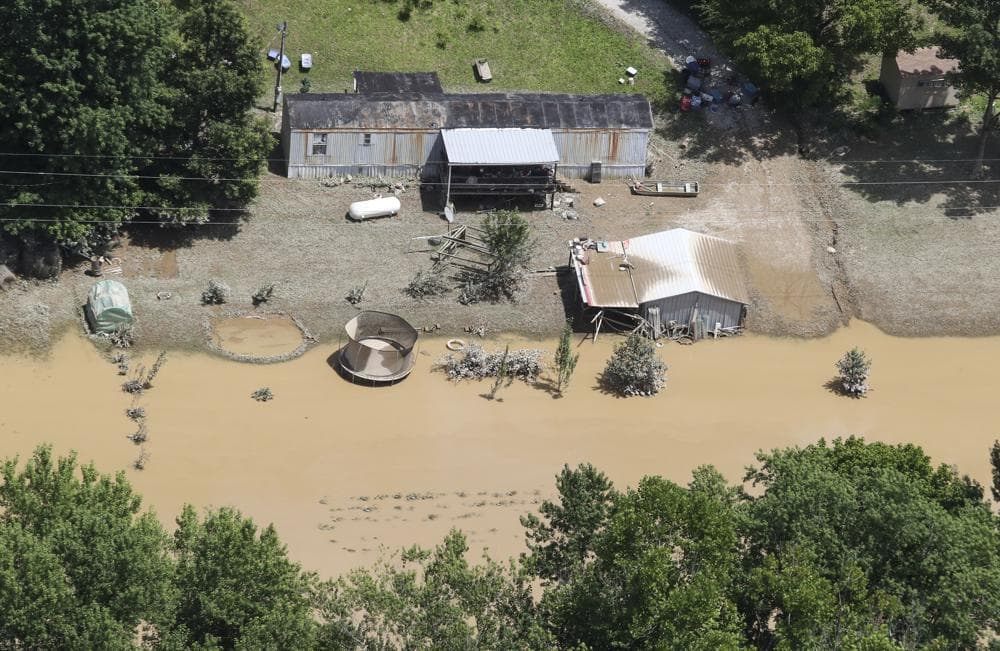Mother of Good Counsel Church in Hazard, Kentucky, tolled its bell as Mass ended Aug. 7, while parishioners named a litany of communities devastated by deadly flooding at the end of July.
The Mass began with a candle lighting in memory of the 37 confirmed deaths when floodwaters swept away whole communities in eastern Kentucky. The paschal candle burned in memory of those still missing.
“You could see it was emotional for those who were affected,” said Lori Helfrich, the parish life director. During the litany, “people named the places as they came (to mind) and the community said, ‘We remember.'”
“Everyone can tell you about someone who has lost their house and nearly everyone can tell you about someone who has died or is missing or unaccounted for,” she said, noting that three parish families had to abandon their homes. “It’s important to do that ritual piece because it helps us process it and it says we’re not forgetting this.”
Helfrich hopes everyone continues to remember eastern Kentucky for at least the next year, as people and their communities recover.
“It will be a long haul,” she said. “There truly is a lot of destruction. It looks like the remnants of a tornado or a hurricane.”
Kentucky Gov. Andy Beshear, who toured hard-hit Breathitt County with President Joe Biden and first lady Jill Biden Aug. 8, said the mission in eastern Kentucky is moving into the next phase — from emergency response to stabilization.
The Diocese of Lexington, a 16,000-plus square-mile diocese that includes eastern Kentucky, is preparing for that phase through its Catholic Charities agency.
With the help of Catholic Charities USA, support from at least seven dioceses and donations from people in more than 40 states, the agency is readying long-term recovery efforts to help Kentuckians rebuild their homes and cope with the life-shattering catastrophe.
As of Aug. 8, donations to Catholic Charities of Lexington’s flood relief fund for eastern Kentucky had reached $195,000 and Catholic Charities USA had contributed $250,000.
The neighboring Archdiocese of Louisville held a special collection Aug. 6-7. Donations are still being received from parishes and will be forwarded to the Lexington agency in the coming weeks, according to the archdiocese.
“We do everything from home repairs to case management, that is to walk with families and provide guidance on paths forward. A lot of these things involve working out the details,” said Meg Campos, executive director of the agency.
Campos is one of three full-time staff members of Catholic Charities of Lexington. A part-time bookkeeper supports their work. And Catholic Charities USA has provided an emergency management specialist to help the local agency coordinate its efforts.
Campos said the agency also intends to hire case managers.
All of this work will be in concert with parishes in the counties affected by the flooding, she told The Record, Louisville’s archdiocesan newspaper.
On Aug. 8, she met by video conference with the parish leaders. They discussed what resources parishes could offer to the effort, what needs their community had and how they could partner with Catholic Charities to answer those needs.
“That’s why our parishes on the ground are invaluable,” she said, noting that parish leaders also know the communities and have the trust of the people there.
During the week of Aug. 8, Catholic Charities was moving a mobile laundry trailer provided by Catholic Charities USA into the area.
The Lexington agency also has brought in shipments of school supplies, food and cleaning products.
St. George Church in Letcher County is providing storage space for Catholic Charities in a mining warehouse for items donated or purchased on pallets.
St. George said it needs gallon jugs of water, cleaning supplies and toiletries — that are on pallets.
Other parishes are collecting a wide variety of items requested by flood survivors — from camp stoves, sleeping bags and tents to water filters, shovels and fans.
Campos said Catholic Charities prefers to buy items in the affected areas to help with local economic recovery, so monetary gifts will have an additional impact.
“We always try to keep the money in the community as much as possible,” she said.
The camping gear is on the list of needs because some people want to stay on their property. Hundreds of displaced families have been placed in temporary housing, such as state park lodges and trailers. But not all.
“People don’t want to leave their land,” said Helfrich, the parish life director in Hazard. “They’re afraid of looters.”
Since the floods struck, Helfrich said, she tends to her usual liturgical and other parish duties and then switches gears, checking on families and working with community outreach partners. She finds where there is need and where there are offers of aid and then matches the two.
“My days are varied a lot,” she said. “A lot of it is being a presence in the community, hearing their stories, being able to pray with them. Sometimes that support and care and compassion is as important as mucking out someone’s house.”
That’s something Helfrich has done, too.
“After the floodwater comes down, there is mud, flood mud,” she explained. “You get everything out of the house and then the mud. Crews have been going out all over the areas to muck people’s houses out. It’s a grueling job.”
Asked what people need most, she said, “We appreciate people’s support and prayers and monetary donations. We will still need help in rebuilding long-term.
“There’s a lot of survivor’s guilt. To know that people are praying for them is really important. People are struggling with, ‘How do I keep going on?'”
– – –
Marnie McAllister is editor of The Record, newspaper of the Archdiocese of Louisville.













